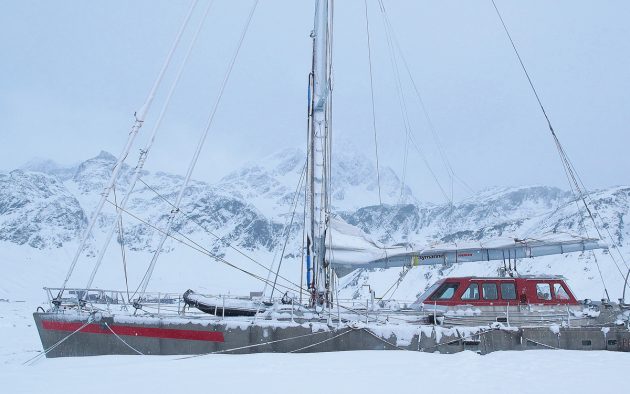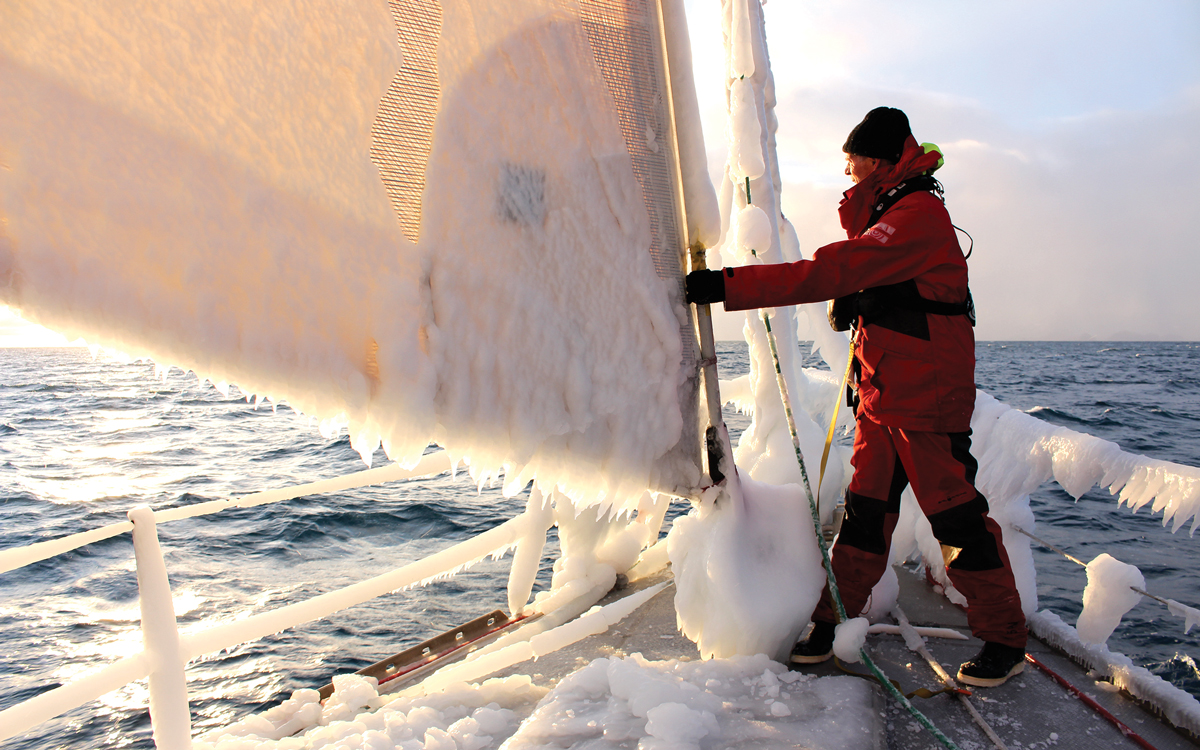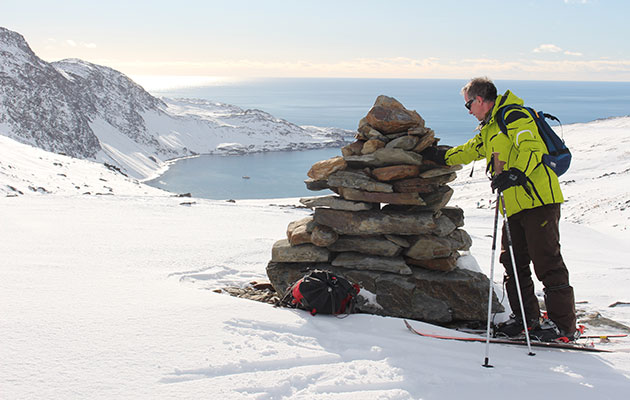Emboldened by success in 2016, Skip Novak sails back to South Georgia to attempt a traverse via the island’s virgin summits
We were eight days out from the south coast of South Georgia and once again we had skied smack into a full-blown white-out. There was nothing for it but to stop and make camp. The five of us set to work building a snow wall to provide wind shelter before the risky job of erecting the two tents.
The first thing was to organise your sleds, skis and gear so as not to be buried in the spindrift accumulating at an alarming rate. Two of us started cutting large snow blocks and handing them on to the three builders but all too soon our goggles were fogged and faces snowed up. We continued by feel, bumping into each other while passing the blocks and then falling over – a right circus.
In spite of -10°C temperatures and what must have been a 50-knot wind, it was hot work as long as you kept moving, which surely discouraged any slackers. After an hour of toil, we had the semblance of a barrier wall and carefully erected one of the tents; stories of tents blown away, smashed by katabatic winds and shredded, are legion on South Georgia. I speak from experience.

Skip has a conversation with a young bull elephant seal before the start of the ski traverse. Photo: James Novak
Darkness was coming on and it was clear the wall was not long enough for two tents in the lee. So all five of us had to dive into one – nice and cozy, overlapping in our damp sleeping bags like sardines in a tin. And guess who was the cook. I managed a cup of soup each, the stove’s flame going perilously close to the tent fabric in the cramped porch.
Stephen Reid, a highly experienced mountaineer with many ascents in the Greater Ranges, including four Greenland expeditions behind him, later admitted to me one evening further on as we were brewing up that he was ‘now cured’. He was pining to get back to Cumbria to his partner, his cottage and his horses. I empathised at the time which, looking back, might mean something.
The British mountaineer Stephen Venables and I have been leading teams to South Georgia (and the Antarctic Peninsula) for the last ten years using my 74ft yacht Pelagic Australis as a mobile base camp.

Skipper Edd Hewett and and mate Charly Bainbridge on board Pelagic Australis. Photo: James Novak
We try to have a group of five or six invitation-only experienced mountaineers being supported by three voyage crew who spend the time while we are in the hills doing the coastal tour with the professional crew. In climbing terms, though, I would venture to say these expeditions often have less likelihood of success than buying a premium ticket to climb Mt Everest.
In 2016 we did complete this same 65km ski traverse from Trollhul Bay ending at St Andrews Bay on the north-west coast’s central section, which is home to the largest king penguin rookery in the world.
That year we cherrypicked and climbed Mt Starbuck and Mt Baume, two technically difficult virgin summits along the sled route, in a rare prolonged spell of high pressure. We were out for 16 days, six of those stormbound in glacier camps.

Pelagic veteran Crag Jones on the traverse pitch of Mt Starbuck in 2016. Photo: James Novak
The optimism that successful expedition engendered (and we quickly file the struggles and painful moments somewhere in the back of the memory bank) led us to believe we could do the same again in 2018. There are many more unclimbed summits still in what must be one of the world’s most remote mountaineering environments.
There is no one to call for a search and rescue on South Georgia and no airstrip. In spite of what could be considered unattractive caveats, we had to return and have another go. What unfolded this season though was a proper thrashing dished out by the island’s volatile weather.
We had five weeks in hand to leave from and return to Port Stanley in the Falkland Islands and we got off to a good start arriving on the island after a four-day downwind passage with some fine sailing. In 2016 we sailed directly into Trollhul Bay in settled weather but with a swell still running on this very lee shore.

In spite of difficult landing conditions we were off the next day for the traverse. No chance this year as it was blowing hard onshore, so we defaulted to go northabout the island, making landfall on the Willis Islands, through Bird Sound and down the coast to King Edward Cove where the South Georgia Government has its administrative base.
This includes the British Antarctic Survey’s (BAS) fish biology lab, which studies the catch and advises government on licensing for Patagonian toothfish, mackerel ice fish, Antarctic cod and krill in its maritime zone.
The over-wintering contingent of BAS numbers 12. Across the bay, the industrial archaeological remains of the whaling station Grytviken, now a museum, has a jetty for yacht use where we watered up and assessed our situation.
With an inauspicious forecast, we waited on the north coast for five days making day ski trips from various anchorages – enjoyable enough but, as always, we felt the pressure of the main objective. The clock was ticking.
Article continues below…
Sailing to high latitudes: Everything you need to know before you set sail
Specialist high latitude yachts invariably have metal hulls and are very solidly built with large fuel tanks and internal steering…
Is it still possible to sail off into the sunset and find somewhere truly remote from civilisation?
How rare it is, to be left to your own devices on a wild island. From the tropics to the…
And then the forecast changed from bad into a humdinger coming out of the east. This is a winter pattern and the wind was predicted to be so strong and prolonged that the concerned harbourmaster offered us the jetty at King Edward Point, which would be in the lee. Most, if not all of the north-east coast anchorages would be dodgy if not dangerous to shelter in and the coast would be basically unnavigable.
That storm lasted a full four days. Metres of snow fell and, to top it off, King Edward Cove, facing south-east, was big enough to accommodate all the brash ice in East Cumberland Bay discharging off the Nordenskjold Glacier. We couldn’t move if we wanted to. We were trapped by the ice under pressure from the wind.
Escape from the ice
When the storm force winds abated down to variable and the pressure on the ice lessened we escaped incarceration and made a beeline for the south-west coast, south about, as Trollhul, usually prone to heavy swell, would be as flat as it gets in the lee of that easterly storm.
Five of us were put ashore with ten days of supplies, camping and climbing gear, all carried in sleds. We waived goodbye to our support crew and did two relays of our gear up a steep slope to gain the Graae Glacier at 250m.

Skip on the inside of an igloo ‘loo’ on the Harmer Glacier – they eventually cut a door to let him out! Photo: James Novak
It was a good start… but that didn’t last long. Our first camp on the Harmer Glacier was a repeat of 2016. It snowed heavily and, over 48 hours, we had 60cm of snow and more banked up around the tents. In 2016 we were stuck for four days in that same place.
In these circumstances there is an urgency to accommodate ablutions in some modicum of comfort. A simple snow latrine with a snow wall works in fine weather but what was needed was a proper igloo – so we built one. My job was to be on the inside and when Venables lowered the keystone into place but then refused to make a door so I could get out, I did question my popularity.
In 2016 we did the same, but the construction was more of a teepee than an igloo, and subsequent Googling of igloo-making before the expedition stood us well. I liked the guy in Chicago making an igloo in his back yard in double-quick time with only a foot of snow. Ours took 12 hours.

Camp Three on the Novosilski Glacier. Photo: James Novak
Finally, the weather cleared on day three so we could move – just. The nightly weather reports via sat phone from Pelagic Australis were not great, but not dramatic either, so we still held out some hope of climbing something.
We struggled, making heavy work of pulling the sleds through deep powder snow up and over the second col. Usually new snowfall on the island consolidates quickly with wind or a temperature change, but this time it didn’t. We were ploughing a furrow rather than sliding on top of the surface.
This persisted for the next four days and we made little progress and, with snow continuing to fall and high winds rendering visibility nil to poor, it was quite obvious climbing would be out for all those reasons plus a high risk of avalanche on the upper slopes.

Roped up for glacier travel with sleds – crevasses are always a risk. Photo: James Novak
So by day five the journey became a hard fight to get to the other end, as we were now past an obvious bail-out point into Iris Bay on the north-east coast; this was not a popular option in the first place.
Like exquisite torture, every now and then it cleared briefly to reveal all those target summits along the spine of the Salvesen: Mt Dow, Smoky Wall, Peak 2,089m – the latter needs a name! And Mt Fraser, an attractive standalone peak hard by the south coast. For the time being they will remain inviolate.
Shortly after our sardine tin night on the Spenceley Glacier, well past any point of return, on day ten skipper Edd expressed obvious concern on the radio sched about making the flight out at the end of the charter – the one flight per week, due that coming Saturday.

A rare spell of good visibility after a big blow at Camp Four on the Spenceley Glacier. Photo: James Novak
We were then at Camp Five, sheltering under a rock buttress that is home to nesting snow petrels that seemed oblivious, flitting about in the spindrift of the gale conditions. We were above the Ross Pass, which is the crux of the journey.
Glacier crossing
A low-slung, broad col of 500m separating the Allardyce Range to the north-west and the Salvesen Range to the south-east, the Ross Pass is a natural venturi that cuts the island’s mountainous spine in half, square on to the prevailing westerlies.
While the entire island can at times be in the clear, this often persists cloud-bound and threatening, clearly giving us ‘the finger.’ Because this stretch of glacier is infamous for putting people on their hands and knees, it must only be attempted in settled weather. And even then you can get caught out.

From the summit of Mt Baume, Mt Pelagic is in the foreground, Mt Fraser on the left and Mt Paget on the right. Photo: James Novak
After descending on to the pass and then descending the Ross Glacier in a white-out, navigating by compass and the feel of the terrain, we spent the last two nights at Camp Six in a jumbled maze of ice at the junction of the Ross and Webb Glaciers (in nil visibility we were not sure exactly where we were).
In 2005 when I did part of this route for the first time we ended at the snout of the Ross Glacier at Little Moltke Harbour in Royal Bay. Even in 2016 this was no longer tenable or safe due to crevassing, seracs and un-skiable moraine – all due to glacial recession.
The entire landscape had changed dramatically in little more than a decade. In that year we opted for an ascent of the Webb Glacier, striking north off the Ross, which connects to the Cook Glacier and leads into St Andrews Bay; to our knowledge, this elegant ski and sled route had never been attempted before.

St Andrews Bay and home to around 300,000 king penguins. Photo: James Novak
We were now getting a bit stretched with lack of sustenance. The last meal was raisins mixed with oats mixed with dregs of pesto, and that was that.
By this time you have read your book. Possibly you have exhausted conversation with your tent mate. You start to read the labels on packaging to pass the time – did you know that Marmite contains barely, wheat, oats and rye?
On day 12 we had to move, or else. It was a bitterly cold start at 0400 but was mitigated by strenuous rope hauling of our sleds up and over pressure ridges, and happily rewarded by a soft landing on the Webb in fine weather by mid morning.

On the way back to Stanley Pelagic Australis sails close to a grand tabular iceberg. Photo: James Novak
The snow had firmed up and, for the first time, we had a solid running surface up slope. Joyfully we skinned up in the sunshine to the col at the head of the Cook Glacier where we could see the shoreline at St Andrews Bay.
What followed was a free-for-all ski down on to the outwash plain and along and through the margins of the king penguin rookery.
We stayed on our skis all the way to the dinghy landing, arriving at dusk under those well known South Georgian lenticular clouds: red, pink and orange. Our support crew was there waiting for us with champagne, traditionally opened with an ice axe. With little time for reflection we up anchored early the next morning and sailed for Stanley.






